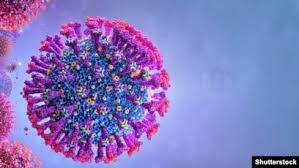
Institute of Biophysics of ANAS held discussions on coronavirus (COVID-19) and ways of protectio, and it was considered important to provide some important information to the public.
Coronaviruses are a large family of viruses that cause respiratory diseases such as common colds. These viruses are spread worldwide among animals. Rarely, coronaviruses can develop and spread from animals to humans. One of these rare cases is the COVID-19 infection of people in Ukan, China. COVID-19 is one of RNA-containing coronaviruses such as SARS and MERS.
COVID-19 spreads almost three times faster than the influenza virus, which dramatically increases the number of patients. Some countries are unable to screen large numbers of patients.
In Azerbaijan, there are very few people who have access to COVID 19, and the government’s radical preventive measures give evidence that the disease will be eradicated relatively quickly.
Most coronavirus symptoms are similar to upper respiratory illnesses such as nausea, cough, sore throat and sometimes high temperatures. If coronavirus infection spreads to the lower respiratory tract (respiratory tract and lungs), it can cause pneumonia, especially in older people, people with heart disease or those with weakened immune systems.
How to respond to coronavirus?
There is no specific cure or vaccine for coronavirus, and most people who are infected recover from it. Persons with coronavirus symptoms should consult a doctor without delay. In addition, it is important to follow the precautionary measures to prevent common cold to help prevent coronavirus infection:
– Wash hands thoroughly with soap and warm water or wipe well with an alcohol-free hand cleanser;
– Keep hands and fingers away from eyes, nose and mouth;
– Avoid close contact with infected people;
– Make less use of public transportation and other crowd places;
– If possible, make online purchases or make payments electronically, by using plastic cards. (Because cash is rich in cellulose fibers, they are a potential virus carrier among cellulose fibers. Although banks in Azerbaijan may disinfect cash, coronavirus can also spread through contact with sick people. Therefore, it is advisable to avoid street trade.)
It is important to note that in many cases, people infected with COVID-19 do not have symptoms of the disease and play a role in carriers. That is why it is so important that everyone follows the rules of disinfecting.
It is necessary to treat colds during coronavirus infection and to alleviate the symptoms:
– Should absorb too much fluid and avoid dehydration;
– Take medication for sore throat and fever; (However, ibuprofen should not be used without a doctor’s advice since it is contraindicated in children and young people 19 years of age.)
Whenever possible, use tools, means etc. different sterilization methods should be used regularly. Sterilization methods may include:
– It is possible to sterilize liquid drugs by filtration from small porous (nano-sized) filters;
– It is possible to sterilize metal, pottery, glass or other water-resistant materials by using thermal sterilization methods (heating, boiling, pressure sterilization, etc.).
Some materials can be sterilized using ultraviolet (UV) light.
A potentially cost effective option for sterilization is Gamma radiation using a Gamma apparatus for large volumes and masses. This method of sterilization can sterilize all materials of metal, cloth and paper of various origin. At the same time, the decrease in the mechanical quality of the material is less than 5%. The intensity of Gamma rays for most viruses tested is from 0.5 Mrad to 2 Mrad.